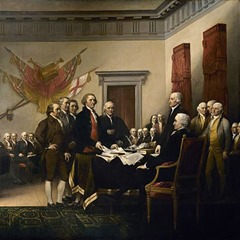The current background music in our house is the soundtrack to Hamilton: An American Musical. This is a good thing, as my wife adores it, I like it more every day, and my son’s understanding of US history is positively impacted. As a parent, as an American and as a thinking person, I want my son to know what the Founding Drunkards were really like. I don’t want him to grow up believing the same lies I was taught when I was his age. For good reason.
Here’s the deal – the Founding Drunkards were human. Flawed, annoying, ridiculous humans. Just like the rest of us. Most everyone who has a knowledge of US history beyond the grade school level is aware of this.
When we are young and our society thinks our young minds need to be instilled with a certain amount of patriotism (often confused with nationalism), we are taught that the Founders are larger-than-life figures, noble in purpose and pure of heart. The idea is to get us to love our country and the Founders are presented as the personification(s) of everything that is good and beautiful and decent about the United States of America.
As we get older, most of us (especially the historians among us) get a fuller, more accurate picture of the Drunkards. We learn a thing or two about their flaws. We discover – despite ourselves – that they were human, and therefore necessarily flawed. And if we really pay attention, we notice that most of them were deeply flawed.
Case in point: slavery. I’m sure most of you know that many of the Founding Drunkards were slave owners (with notable exceptions – Hamilton, for instance, was a dedicated abolitionist). I’m sure you’re also aware of the usual narratives offered to explain why it’s somehow magically okay that they were slave owners. We are told, for instance, that Washington inherited slaves (as though this made it acceptable). And this is partially true. When he was eleven years old, Washington inherited ten slaves. At the time of his death, however, there were a total of 318 slaves residing at Mount Vernon.
Washington was by no means unique in this. Jefferson’s relations with his slaves are well known. The point is that the bulk of them weren’t exactly against slavery.
I am not judging these men here. I am merely trying to underscore a point. You see, all of the Founding Drunkards knew – they knew – that slavery was morally wrong. Yet for many of them their economic standing depended upon slavery. They were rich and powerful men and their wealth and their power depended upon slavery. Which leads to my point, which is important enough to merit large boldface letters:
When faced with a choice between their morals or their wealth and power, they did NOT choose their morals.
Does this make them bad people? Maybe. I don’t know, and that’s not what I’m talking about here.
What I’m talking about is the basic design spec of the United States of America. This country was designed by a bunch of guys who cared more about their own wealth and power than about other people’s basic human rights. Hell – they ranked their own wealth and power above their own morals. Their priorities and motives are evident.
And these are the guys who designed our government and our political system.
Think about that for a minute.
From the outset, the United States of America was designed by a bunch of rich white guys for the express purpose of preserving and advancing their own personal wealth and power. For this reason, they specifically designed it to be an amoral system. And this turned out to be both a bug and a feature.
It’s a feature because it made for the separation of church and state, an idea that worked pretty well until the 1950s when American politicians started trying to inject their own personal God into our lives. We’ve been striving against this ever since – and have been largely successful – but the struggle continues. As you probably already know.
The amoral nature of our system is a bug in that there is absolutely no common decency built into it whatsoever. But it’s an easy bug to forgive because there’s no reasonable way to achieve the feature without also accepting the bug.
The problem with all of this is that most of us – deep down – don’t really understand it. We may know the details on an intellectual level, but underneath it all we really believe it’s something different. When we are children and are taught about the Founders as great and noble and admirable, we are instilled with an unreasonable – and unreasoning – faith in our political system.
And this gives us funny ideas about politics. We find ourselves believing in things rather than thinking about them. We forget that politics attracts wealthy, powerful, ambitious people. We believe that there really can be larger than life figures who – superhero-like – will arrive on the political scene and save us all.
I’m sorry to inform you that this just isn’t the case. It never has been, nor will it ever be. It just simply is not in the job spec. In fact, the nature of American politics actively repulses people who do not place their own ambition above morals and ethics.
This is not a problem if we simply look at the situation clearly. What we have right now in the United States of America is a job opening. Just that. I’m not drawing an analogy here – we really do have a job opening and it’s up to We The People to fill it. And if you’ve been part of the hiring process before you know that it’s always a bad idea to fill a job vacancy based only on how much you like a particular candidate.
I’m not telling you who to vote for. I assume that if you’ve read this far you probably have enough interest in the process to already be leaning toward a specific candidate. Chances are there’s somebody running whose message resonates with you and who is saying the kind of things you want to hear.
Which means they wrote a good cover letter. They figured out which things you – a prospective employer – want to hear, and they smartly said those things. This is an important part of the hiring process, but it’s just the beginning. Now it’s time to read the résumé.
Seriously. You wouldn’t hire someone based on their cover letter without also reading their résumé. So why would you elect someone based solely on their speeches without also considering their qualifications?
This should not be an emotional process, America, but a rational one.



Leave a comment
Comments feed for this article